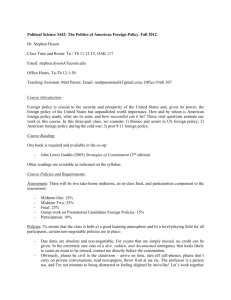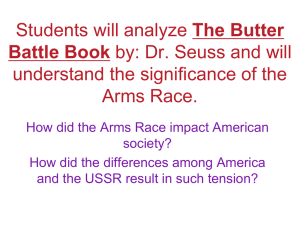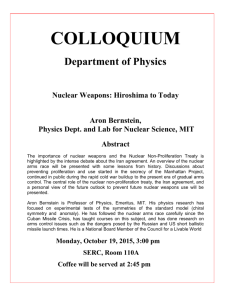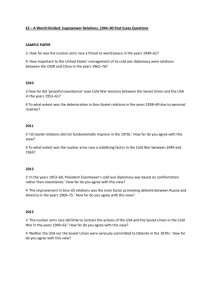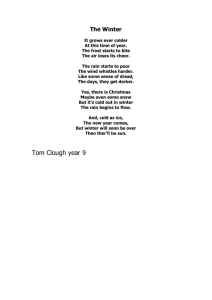314, U.S. National Security Policy
advertisement
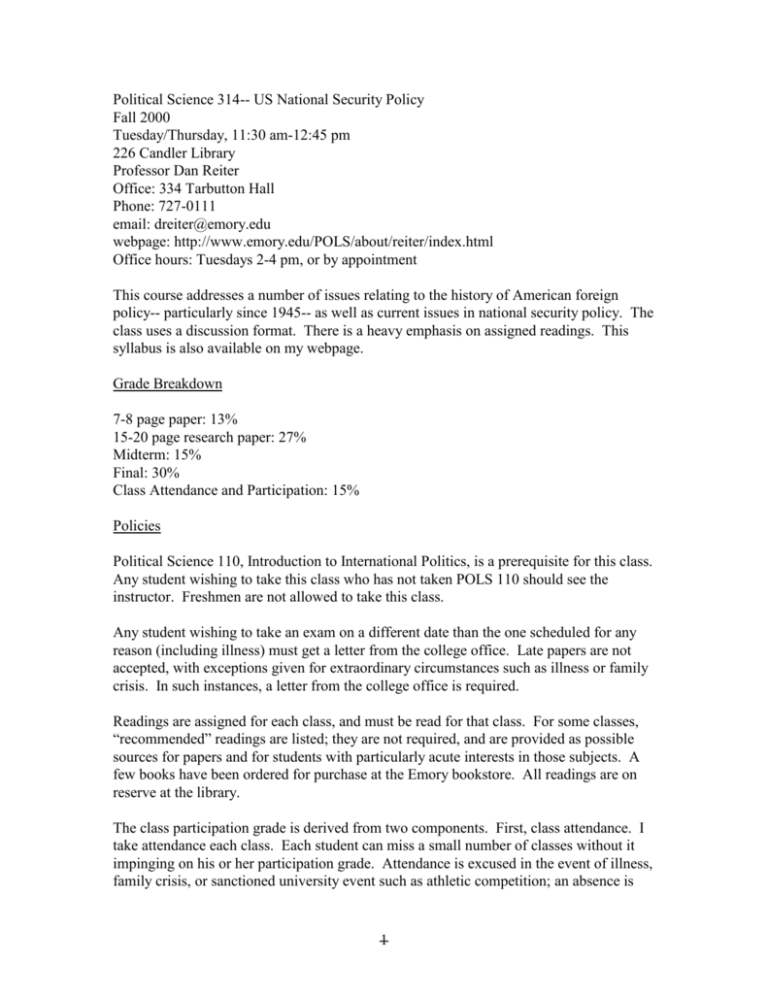
Political Science 314-- US National Security Policy Fall 2000 Tuesday/Thursday, 11:30 am-12:45 pm 226 Candler Library Professor Dan Reiter Office: 334 Tarbutton Hall Phone: 727-0111 email: dreiter@emory.edu webpage: http://www.emory.edu/POLS/about/reiter/index.html Office hours: Tuesdays 2-4 pm, or by appointment This course addresses a number of issues relating to the history of American foreign policy-- particularly since 1945-- as well as current issues in national security policy. The class uses a discussion format. There is a heavy emphasis on assigned readings. This syllabus is also available on my webpage. Grade Breakdown 7-8 page paper: 13% 15-20 page research paper: 27% Midterm: 15% Final: 30% Class Attendance and Participation: 15% Policies Political Science 110, Introduction to International Politics, is a prerequisite for this class. Any student wishing to take this class who has not taken POLS 110 should see the instructor. Freshmen are not allowed to take this class. Any student wishing to take an exam on a different date than the one scheduled for any reason (including illness) must get a letter from the college office. Late papers are not accepted, with exceptions given for extraordinary circumstances such as illness or family crisis. In such instances, a letter from the college office is required. Readings are assigned for each class, and must be read for that class. For some classes, “recommended” readings are listed; they are not required, and are provided as possible sources for papers and for students with particularly acute interests in those subjects. A few books have been ordered for purchase at the Emory bookstore. All readings are on reserve at the library. The class participation grade is derived from two components. First, class attendance. I take attendance each class. Each student can miss a small number of classes without it impinging on his or her participation grade. Attendance is excused in the event of illness, family crisis, or sanctioned university event such as athletic competition; an absence is -1 considered excused only if the student has a letter from the college office or other appropriate documentation. If a student begins to accumulate several excused absences, he or she will have to complete extra assignments or else his or her participation grade will suffer. Any student who accumulates 12 or more unexcused absences will automatically receive a 0 for his or her overall class participation grade. Second, participation in class discussion and activities. I distribute discussion questions for each class’s reading before the class meets. I will call on students to answer the day’s discussion questions, and the student’s answer will affect the student’s participation grade. Students will be called on randomly. Additionally, each student’s level of voluntary participation both in discussion and class activities throughout the semester will be factored into the participation grade. Lastly, each student will participate in at least one formal in-class debate during the semester. This course can satisfy the writing requirement, but only if a student gets a C or higher on the long research paper. If a student takes the course pass/fail, the student must get a C or higher to pass. Books John Lewis Gaddis, Strategies of Containment: A Critical Appraisal of Postwar American National Security Policy (Oxford: Oxford University Press, 1982), George F. Kennan, American Diplomacy, expanded edition (Chicago: University of Chicago Press, 1984). Andrew F. Krepinivich, Jr., The Army and Vietnam (Baltimore: Johns Hopkins University Press, 1986). Ernest May, “Lessons” of the Past: The Use and Misuse of History in American Foreign Policy (Oxford: Oxford University Press, 1973). Scott D. Sagan and Kenneth N. Waltz, The Spread of Nuclear Weapons: A Debate (New York: W.W. Norton, 1995). Patrick M. Regan, Civil Wars and Foreign Powers: Outside Intervention in Intrastate Conflict (Ann Arbor: University of Michigan Press, 2000). Recommended for purchase: John Mueller, Retreat From Doomsday: The Obsolescence of Major War (New York: Basic Books, 1989), Stephen E. Ambrose with Douglas G. Brinkley, Rise to Globalism: American Foreign Policy Since 1938, 8th Revised edition (New York: Penguin, 1997). John W. Dower, War Without Mercy: Race and Power in the Pacific War (New York: Pantheon, 1986). *=reading available for purchase I. General Perspectives. -2 August 31-- Introduction to Course September 5-- First Perspective: Realist *George F. Kennan, American Diplomacy, expanded edition (Chicago: University of Chicago Press, 1984), 3-103. September 7-- Second Perspective: Race and Ideology *John W. Dower, War Without Mercy: Race and Power in the Pacific War (New York: Pantheon, 1986), pp. 3-93. Recommended: Michael H. Hunt, Ideology and U.S. Foreign Policy (New Haven: Yale University Press, 1987). September 12-- Third Perspective: Influence of History on Foreign Policy *Ernest May, “Lessons” of the Past: The Use and Misuse of History in American Foreign Policy (Oxford: Oxford University Press, 1973), ix-xiv, 3-18, 52-121. II. History of Cold War. September 14-- Origins of Cold War *Stephen E. Ambrose, Rise to Globalism: American Foreign Policy Since 1938, 7th rev. ed. (New York: Penguin, 1993), 52-94. Melvyn P. Leffler, A Preponderance of Power: National Security, the Truman Administration, and the Cold War (Stanford: Stanford University Press, 1992), 495-518. John Lewis Gaddis, “The Tragedy of Cold War History,” Diplomatic History 17 (Winter 1993), 1-16. September 19-- History of Cold War: Containment and Korea *John Lewis Gaddis, Strategies of Containment: A Critical Appraisal of Postwar American National Security Policy (Oxford: Oxford University Press, 1982), 25126. *Kennan, American Diplomacy, 107-128. September 21-- History of Cold War: 1950s and the New Look *Gaddis, Strategies of Containment, 127-236. -3 September 26-- The Vietnam War—Political Choices *Gaddis, Strategies of Containment, 237-273. September 28-- The Vietnam War—Military Strategies *Andrew F. Krepinivich, Jr., The Army and Vietnam (Baltimore: Johns Hopkins University Press, 1986), 3-26, 164-257. Recommended: Mao Tse-Tung, On Guerrilla Warfare, Samuel B. Griffith, trans. (New York: Praeger, 1961). Scott Gartner, Strategic Assessment in War (New Haven: Yale University Press, 1997). October 3-- History of Cold War—Detente *Gaddis, Strategies of Containment, 274-357 October 5-- End of the Cold War—The Reagan Years and Peace Through Strength *Stephen E. Ambrose with Douglas Brinkley, Rise to Globalism: American Foreign Policy Since 1938, Eighth revised edition (New York: Penguin, 1997), 303-380. *John Lewis Gaddis, "Hanging Tough Paid Off," Bulletin of Atomic Scientists 45 (January-February 1989): 11-14. October 10-- End of Cold War—Alternative Explanations Rough Draft of First Paper Due Matthew Evangelista, "Internal and External Constraints on Grand Strategy: The Soviet Case," in The Domestic Bases of Grand Strategy, Richard Rosecrance and Arthur Stein, eds. (Ithaca: Cornell University Press, 1993), 154-178. Janice Gross Stein, "Political Learning by Doing: Gorbachev as Uncommitted Thinker and Motivated Learner," International Organization 48 (Spring 1994): 155-183. Recommended: Daniel Deudney and G. John Ikenberry, "The International Sources of Soviet Change," International Security 16 (Winter 1991/92): 74-118. Jeff Checkel, "Ideas, Institutions, and the Gorbachev Foreign Policy Revolution," World Politics 45 (January 1993): 271-300. Sarah E. Mendelsohn, “Internal Battles and External Wars: Politics, Learning, and the Soviet Withdrawal from Afghanistan,” World Politics 45 (April 1993): 327-360. -4 Robert G. Herman, “Identity, Norms, and National Security: The Soviet Foreign Policy Revolution and the End of the Cold War,” in The Culture of National Security: Norms and Identity in World Politics, Peter J. Katzenstein, ed. (New York: Columbia University Press, 1996), 271-316. Matthew Evangelista, Unarmed Forces: The Transnational Movement to End the Cold War (Ithaca: Cornell University Press, 1999). III. Current Issues in American National Security Policy. October 12-- Third Party Intervention, I Final Draft of First Paper Due *Patrick M. Regan, Civil Wars and Foreign Powers: Outside Intervention in Intrastate Conflict (Ann Arbor: University of Michigan Press, 2000), 1-63. Recommended: Stephen J. Solarz and Michael E. O’Hanlon, “Humanitarian Intervention: When is Force Justified?” Washington Quarterly 20: 4 (1997): 3-14. Chaim Kaufmann, “Intervention in Ethnic and Ideological Civil Wars: Why One Can be Done and the Other Can’t,” Security Studies 6 (Autumn 1996): 62-100. Jonathan Dean, "A Stronger U.N. Strengthens America," Bulletin of Atomic Scientists (March-April 1995): 45-51, 53-4. October 17—No Class; Fall Break October 19—Third Party Intervention, II *Regan, Civil Wars and Foreign Powers, 65-152. Recommended: Roland Paris, “Peacebuilding and the Limits of Liberal Internationalism,” International Security 22 (Fall 1997): 54-89. Carl Kaysen and George W. Rathjens, “Send In the Troops: A UN Foreign Legion,” Washington Quarterly 20 (Winter 1997): 207-228. Gideon Rose, “The Exit Strategy Delusion,” Foreign Affairs 77 (January-February 1998): 56-67 Paul F. Diehl, Jennifer Reifschneider, and Paul R. Hensel, “United Nations Intervention and Recurring Conflict,” International Organization 50 (Autumn 1996): 683-700. October 24—Midterm -5 October 26— Nuclear Proliferation: Consequences *Scott D. Sagan and Kenneth N. Waltz, The Spread of Nuclear Weapons: A Debate (New York: W.W. Norton, 1995), 1-91. October 31-- Nuclear Proliferation: Motivations and Antidotes Scott D. Sagan, “Why Do States Build Nuclear Weapons? Three Models in Search of a Bomb,” International Security 21 (Winter 1996/97): 54-86. Aaron Karp, “Indian Ambitions and the Limits of American Influence,” Arms Control Today 28 (May 1998): 14-21. Thomas Graham, Jr., “South Asia and the Future of Nuclear Non-Proliferation,” Arms Control Today 28 (May 1998): 3-6. Recommended: Michael J. Mazarr, “Going Just a Little Nuclear: Nonproliferation Lessons from North Korea,” International Security 20 (Fall 1995): 92-122. Harald Müller and Mitchell Reiss, "Counterproliferation: Putting New Wine in Old Bottles," Washington Quarterly 18 (Spring 1995): 143-154. Waldo Stumpf, “South Africa’s Nuclear Weapons Program: From Deterrence to Dismantlement,” Arms Control Today 25 (December 1995/January 1996): 3-8. Sherman W. Garnett, “Ukraine’s Decision to Join the NPT,” Arms Control Today 25 (January/February 1995): 7-12. Leon V. Sigal, “The North Korean Nuclear Crisis: Understanding The Failure of the ‘Crime-and-Punishment’ Strategy,” Arms Control Today 27 (May 1997): 3-13. November 2-- Russia Paul Kubicek, “Russian Foreign Policy and the West,” Political Science Quarterly 114 (Winter 1999-2000): 547-568. Michael McFaul, “Getting Russia Right,” Foreign Policy no. 117 (Winter 1999-2000): 58-71. November 7—NATO Jane M. O. Sharp, “The Case for Opening up NATO to the East,” in The Future of NATO: Enlargement, Russia, and European Security, Charles-Phillippe David and Jacques Levesque, eds. (Montreal: McGill-Queens University Press, 1999), 27-34. John Lewis Gaddis, “History, Grand Strategy and NATO Enlargement,” Survival 40 (Spring 1998): 145-151. Recommended: -6 Robert J. Art, “Creating a Disaster: NATO’s Open Door Policy,” Political Science Quarterly 113 (Fall 1998): 383-403. “The Debate Over NATO Expansion: A Critique of the Clinton Administration’s Responses to Key Questions,” Arms Control Today 27 (September 1997): 3-10. Amos Perlmutter and Ted Galen Carpenter, “NATO’s Expensive Trip East: The Folly of Enlargement,” Foreign Affairs 77 (January/February 1998): 2-6. Bruce Russett and Allan C. Stam, “Courting Disaster: An Expanded NATO versus Russia and China,” Political Science Quarterly 113 (Fall 1998): 361-382. November 9— China Richard Bernstein and Ross H. Munro, “The Coming Conflict with America,” Foreign Affairs 76 (March/April 1997): 18-32. Robert S. Ross, “Beijing as a Conservative Power,” Foreign Affairs 76 (March/April 1997): 33-44. Samuel S. Kim, “China as a Great Power,” Current History 96 (September 1997): 246251. Recommended: Chalmers Johnson, “The Chinese Way,” Bulletin of the Atomic Scientists 53 (January/February 1997): 20-25. David Shambaugh, “Containment or Engagement of China? Calculating Beijing’s Responses,” International Security 21 (Fall 1996): 180-209. November 14-- Airpower Daniel L. Byman and Matthew C. Waxman, “Kosovo and the Great Air Power Debate,” International Security 24 (Spring 2000): 5-38. Recommended: Robert A. Pape, Bombing to Win (Ithaca: Cornell University Press, 1996). November 16-- US Grand Strategy After the Cold War: Engagement vs. Isolation Robert J. Art, "Geopolitics Updated: The Strategy of Selective Engagement,” International Security 23 (Winter 1998/99): 79-113. Eugene Gholz, Daryl Press, and Harvey M. Sapolsky, “Come Home, America: The Strategy of Restraint in the Face of Temptation,” International Security 21 (Spring 1997): 5-48. Recommended: -7 Joseph S. Nye, Jr., “Conflicts after the Cold War,” Washington Quarterly 19 (Winter 1996): 5-24. John Mueller, “Policy Principles for Unthreatened Wealth-Seekers,” Foreign Policy no 102 (Spring 1996): 22-33 November 21-- US Grand Strategy After the Cold War: Unipolar Dominance Robert Kagan, “The Benevolent Empire,” Foreign Policy 111 (Summer 1998): 24-35. Charles William Maynes, “The Perils of (and for) and Imperial America,” Foreign Policy 111 (Summer 1998): 36-47. November 23—No Class, Thanksgiving November 28— Arms Control and Missile Defense after the Cold War Keith B. Payne, “The Case for National Missile Defense,” Orbis 44 (Spring 2000): 187196. George Lewis, Lisbeth Gronland, and David Wright, “National Missile Defense: An Indefensible System,” Foreign Policy no. 117 (Winter 1999-2000): 120-136. Note: be sure to read box columns on pages 127 and 132-33 of the Lewis, Gronland, and Wright article. Mandelbaum, The Dawn of Peace in Europe, 81-94. Recommended: John Pike, “Ballistic Missile Defense: Is the U.S. ‘Rushing to Failure’?” Arms Control Today 28 (April 1998): 9-13. John Pike and Marcus Corbin, “Taking Aim at the ABM Treaty: THAAD and U.S. Security,” Arms Control Today 25 (May 1995): 3-8. Jack Mendelsohn, “A Tenth Inning for Star Wars: The ABM Treaty is in Danger,” Bulletin of the Atomic Scientists 52 (January/February 1996): 24, 28-31. Stanley A. Riveles, “The Treaty is Safe,” Bulletin of the Atomic Scientists 52 (January/February 1996): 25-27. November 30— American Public Opinion and the Use of Force Rough Draft of Long Paper Due in Class Edward N. Luttwak, “A Post-Heroic Military Policy,” Foreign Affairs 75 (July-August 1996): 33-44. Steven Kull and I. M. Destler, Misreading the Public: The Myth of a New Isolationism (Washington: Brookings Institution Press, 1999), 35-58. Recommended: -8 Eugene R. Wittkopf, “What Americans Really Think about Foreign Policy,” Washington Quarterly 19 (Summer 1996): 91-106. Benjamin I. Page and Robert Y. Shapiro, The Rational Public: Fifty Years of Trends in Americans’ Policy Preferences (Chicago: University of Chicago Press, 1992). IV. A New World Order? December 5— Future World Orders Final Draft of Long Paper Due in Class Francis Fukuyama, “End of History?” National Interest (Summer 1989): 3-18. Thomas L. Friedman, The Lexus and the Olive Tree, newly updated and expanded edition (New York: Anchor Books, 2000), 3-16. December 7—Is War Obsolete? *John Mueller, Retreat From Doomsday: The Obsolescence of Major War (New York: Basic Books, 1989), 3-13, 217-269. Donald Kagan, “History is Full of Surprises,” Survival 41 (Summer 1999): 140-143. December 12-- Review for final, catchup Friday, December 15, 4:30-7:00-- final exam -9
